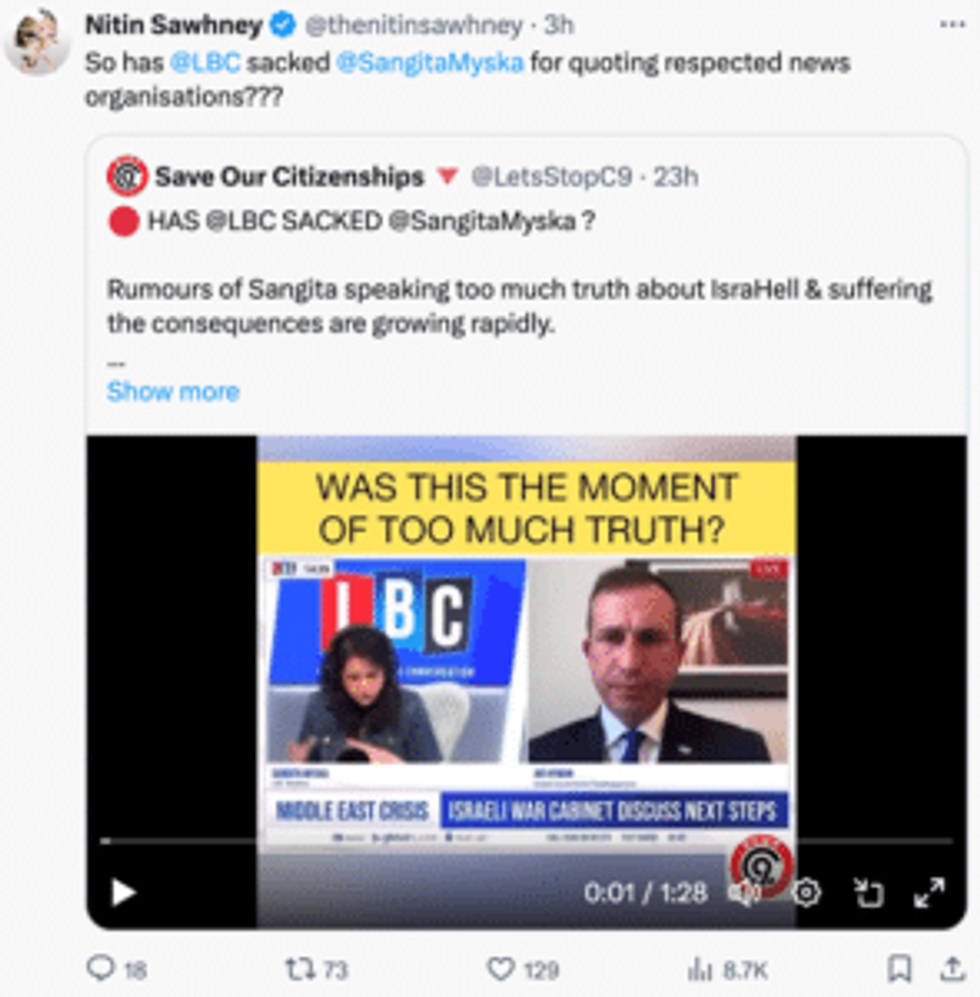LET'S be clear, Sangita Myska is a star journalist and broadcaster.
Like me, but a while later, she was a BBC trainee. Unlike me, she successfully navigated the corporation’s shark-infested waters, becoming an immensely popular correspondent. During my 24-year BBC career, I had the privilege of often sitting in the same newsroom, and I watched her grow into the ferociously forensic journalist she is today.
I left the BBC in 2010, and then in 2022, Sangita quit to join LBC, while her star looked to be in the ascendence – high profile Radio 4 programmes and a regular face on BBC TV’s main flagship news programmes. Don’t get me wrong, LBC is another broadcasting giant. It spawned the careers of legends Bob Holness, Douglas Cameron, Jon Snow and Brian Hayes. Forgive me for not mentioning others. I was a big fan. Its news writing, so tight. Its voices, so authoritative. Its interviews, so incisive. And remember, if you cut me open, I bleed BBC. For Sangita, the switch to commercial radio opened up a new persona. No longer hidebound by BBC and Ofcom rules of impartiality in news, she flourished and wore her heart on her sleeves as a commentator and grand inquisitor.
Casual racism
Who could forget her Cree de Coeur in August 2022, when Anna from Widnes implied neither Sangita nor the black footballer, Marcus Rashford, were British because they weren’t white. Dignified. Courageous. Inspirational. To all of us who face the casual racism that our prime minister and his ministers of colour deny daily.
Unlike many on talk radio today, Sangita earned her stripes. She led a team which uncovered child trafficking in Bulgaria. Her Wiki page lists just a fraction of her achievements. So, imagine my dismay when I read a re-tweeted post by another legend, Nitin Sawhney.
“So has @LBC sacked @SangitaMyska for quoting respected news organisations???”
Below was a post from Save Our Citizenships.
“HAS @LBC SACKED @SangitaMyska? Rumours of Sangita speaking too much truth about IsraHell & suffering the consequences are growing rapidly.”
Gardening leave?
The first rule of journalism – accuracy – check your facts; go to the primary source. No response from Sangita. But her Instagram page has a photo of a garden. Could she be on gardening leave?
Eastern Eye contacted LBC – the response came there none. But X, formerly known as Twitter, has blown up with indignation. Her fans aren’t waiting for confirmation, they’ve started a petition calling for Sangita’s reinstatement.
Still, these are secondary sources, so I did my own digging.
Big audiences
One, who texted on the condition of anonymity, said of Sangita, “She built one of the biggest audiences at LBC in under two years. Sangita has a reputation for fair balanced and robust journalism, it’s come as a shock to many listeners to see that she’s no longer presenting at the station. LBC’s first and only south Asian female presenter she’s built a loyal audience – who’s expressing its outrage. Sangita’s known for being transparent about when she will be away from her show that had grown an audience of around half a million listeners each weekend.”
Another sent this message on WhatsApp, “Sangita’s reputation has been built on firm but fair holding to account interviews that have been viewed by millions across the world. Her coverage of racism and social justice issues in the U.K., and her sensitive coverage of the war in Gaza has won her particular plaudits.”
In an age when you have politicians interviewing other politicians from their own party and calling it news. In an age when anyone can rant their opinion, no matter how uninformed and jump to inaccurate conclusions demonising minority communities. In an age when white people still run mainstream media and jealously guard it from people of colour whom they will never respect. It is refreshing to hear views and questions from someone whose skin colour matches mine. It is refreshing to hear passionate questions. And it is refreshing to hear someone make sense of what is going on in OUR country.
Explanation
Sangita and I won’t always agree. I’m too much of a coward to get mixed up in Middle East politics. I’m not expert enough. All I know is that in politics and conflict, blame is two-handed.
I’m not sure why LBC would inflict damage on itself. Could it be that advertisers didn’t like what Sangita had to say? LBC owes us an explanation why it’s taking off one of the country’s most talented broadcasters – if it were, that is.
Let me make my case.
In American parlance, Sangita uses her bully pulpit for good. She is highly respected. She researches meticulously. And like all talented journalists, Sangita holds power to account. LBC, isn’t that what she should be doing, and shouldn’t you be the force for good and allow your presenters to speak truths no matter how unpalatable? After all, you have airwaves which belong to us, and nothing is more hallowed than our ability to access free speech. The country I know is built on the proudest record of fighting for the underdog. And if you have let go Sangita, then you have weakened our cause, and you have taken off air a champion whose identity, thoughts and questioning should define today’s Britain.







Gardening leave or something more sinister … why has LBC fallen out of love with Sangita Myska?
LBC owes an explanation why it's taking off one of the country's most talented broadcasters